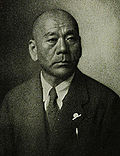Iwanami Shigeo
Iwanami Shigeo ( Japanese 岩 波 茂雄 ; born August 27, 1881 in Nakasu (中洲 村), Nagano Prefecture ; died April 25, 1946 ) was a Japanese publisher and founder of Iwanami Publishing .
life and work
Iwanami Shigeo came from a peasant family. Inspired by attending high school, he went to Tōkyō and graduated from the Department of Philosophy at Tokyo University . He became a teacher at a girls' school in Tōkyō, but gave up this activity after four years and opened a second-hand bookshop in the Kanda district in 1913 . In 1914 he was able to publish Natsume Sōseki's novella " Kokoro ", with which he had such a success that he decided to convert his second-hand bookshop into a publisher permanently.
From 1915 Iwanami published a twelve-volume series of books on philosophy, "Tetsugaku Sōsho" (哲学 叢書). Other early publications consisted of literary and philosophical essays by friends from college. He achieved good sales with it and further expanded his publishing program in this direction, also publishing books with scientific or social science content. In 1917, after Natsume's death, he published his complete works in 12 volumes (漱 石 全集), which was a great success. In the same year he published a first magazine with the title "Shichō" (思潮), about "Thoughts", which was also successful.
In 1927, after inexpensive editions known as "one-yen books" (円 本, Enpon) had become popular in bookstores, Iwanami, inspired by the German Reclam volumes, started his own paperback series in A6 format under the name "Iwanami Bunko "(岩 波 文庫). This series became very successful. Over the years the following composition emerged: 50% Japanese and foreign classical novels, 45% classical philosophy (before Hegel) and 5% modern philosophers (Marx, Engels, Lenin).
In 1940 Iwanami founded the "Fujukai" (風 樹 会), a foundation to support students and scientists. In the same year he was charged with violating the publishing law as a publisher of the writings of the historian Tsuda Sōkichi . It was about books like "Research on Japanese Antiquity" (日本 上代 史 研究, Nihon jōdai kenkyū). Tsuda and Iwanami were found guilty in 1942 but acquitted on appeal in 1944. Iwanami turned to the newspaper Asahi Shimbun with an article in support of the constitutional lawyer Minobe Tatsukichi , whose writings on the constitution had been banned for degrading the Tennō.
Iwanami's publishing house became a well-known institution that was particularly valued by liberal intellectuals. In 1946 Iwanami was awarded the Japanese Order of Culture for his life's work . His grave is at the Tōkei-ji Temple in Kamakura .
Remarks
- ↑ Today a district of Suwa (Nagano) .
Individual evidence
- ↑ a b c d Bauermeister: Development of the modern Japanese publishing industry. Case study Iwanami shoten.
literature
- S. Noma (Ed.): Iwanami Shigeo . In: Japan. An Illustrated Encyclopedia. Kodansha, 1993, ISBN 4-06-205938-X , p. 642.
- Junko Bauermeister: Development of the modern Japanese publishing industry. Case study Iwanami shoten . Studienverlag Brockmeyer, Bochum, 1980. ISBN 3-88339-111-5 .
Web links
| personal data | |
|---|---|
| SURNAME | Iwanami, Shigeo |
| ALTERNATIVE NAMES | 岩 波 茂雄 (Japanese) |
| BRIEF DESCRIPTION | Japanese publisher |
| DATE OF BIRTH | August 27, 1881 |
| PLACE OF BIRTH | Nakasu (中洲 村), Nagano Prefecture |
| DATE OF DEATH | April 25, 1946 |
